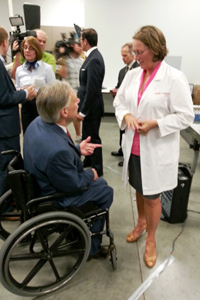Texas or DC: Who do you want regulating your doctor?
 Peggy Fikac once again proves that she’s not a reporter, and most certainly not anything like a fair and balanced media representative.
Peggy Fikac once again proves that she’s not a reporter, and most certainly not anything like a fair and balanced media representative.
From the Houston Chronicle’s coverage of events in Austin, today:
“Obamacare is the wrong prescription for American health care, and I will never stop fighting against it,” Abbott said, joined by small business people and a doctor who also oppose the law at a company, the Texas Mailhouse.
One reason that Abbott gave for fighting the law came in response to a doctor who asked him from the audience about what Texas could do to keep the federal law from interfering with doctors’ judgment about the best way to treat their patients.
“You’re raising one of the more challenging components of Obamacare, and a hidden component in a way, and that is government is stepping in between the doctor-patient relationship and trying to tell you what you can and cannot do, interfering with both your conscience and your medical oath to take care of your patient,” said Abbott, who is campaigning to succeed Gov. Rick Perry.
That is similar to arguments raised against tighter abortion restrictions approved in special session, including a ban on the procedure at 20 weeks, along with stricter regulations on clinics and abortion-inducing drugs.
I am that doctor from the audience. Ms. Fikac is correct that I voiced concern over the Federal interference between the patient and the doctor. She’s flat wrong about Texas regulation of medicine by bringing abortionists up to standards.
I prefaced the question by noting that it is the State of Texas that properly regulates Texas Doctors and medicine. At the State level, patients and doctors have more influence on our elected officials and the people they appoint to write regulations and enforce the law than we do on the Federal level.
I also noted that because of the increasing interference over the years by Medicare, I am concerned about the reach that this new set of regulations will have, including ever-invasive micro-reporting of patient’s private medical conditions. (I named the upcoming move to the ICD-10, which will be a nightmare, requiring doctors to make distinctions between medical conditions, out to five (5) decimal places.
As bad as the bureaucracy of the Office of the Inspector General for the Federal Health and Human Services and the Centers for Medicare and Medicaid Services have been in the past, I don’t look forward to the additional layer of IRS income verification, audits and enforcement.
We could stick closer to home, with the Texas Health and Human Services, the Texas Medical Board, and the Texas Insurance Commission!
Additional posts on the "train wreck" that is ObamaCare (I'm finding quite a few, so there's more to come):
"ObamaCare's effects difficult to measure: USA Today"
From the USAToday, August 8, 2013:
When California announced that individual premiums in its health insurance exchange could be 29% lower than expected, President Obama cheered. When Indiana announced premiums might be 72% higher than before, state officials predicted doom. So who is right? Are health insurance premiums going up or down?
We don't know, at least in part, because both sides are playing with the numbers. To be sure, natural variation exists in how state insurance markets will be affected, but consumers should also be aware of how premium comparisons are twisted to reach predetermined results. Here are five ways they have been slanted...
Read more via ObamaCare's effects difficult to measure
"Obamacare months behind in testing IT data security: government"
Just in case you thought we were exaggerating:
The missed deadlines have pushed the government's decision on whether information technology security is up to snuff to exactly one day before that crucial date, the Department of Health and Human Services' inspector general said in a report.
As a result, experts say, the exchanges might open with security flaws or, possibly but less likely, be delayed.
****
IDENTITY THEFT?
When people try to enroll in health insurance starting on October 1 for insurance plans taking effect in 2014, their identity, income and other information they furnish with their application will be funneled through a federal "data hub."
The hub is like a traffic circle for data. It does not itself store information, but instead has digital spokes connecting to the Internal Revenue Service and other agencies that will allow it to verify information people provide. Opponents of Obamacare have repeatedly raised concerns that sensitive personal information could be stolen.
Read more of the story via Obamacare months behind in testing IT data security: government |
Hat Tip to Congressman Michael Burgess and today's "TMA Member Physician's Daily"
To read more articles by Beverly Nuckols, check out wingright.org.




Comments
Join the Discussion on Facebook
Join the discussion on Facebook.